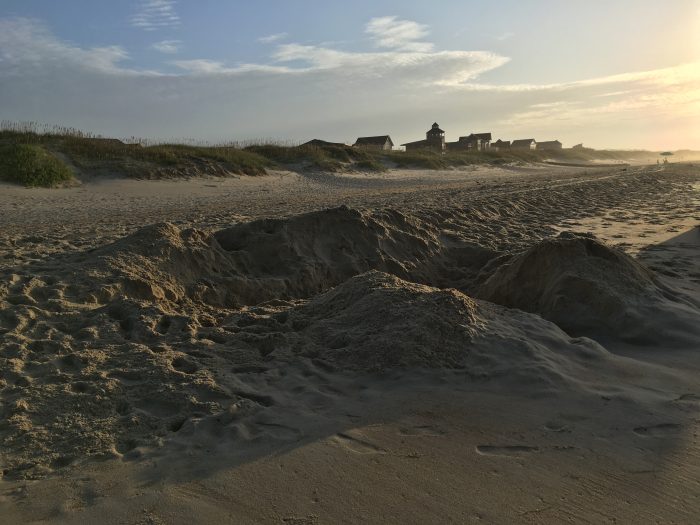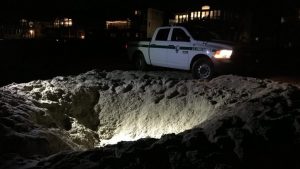
Our co-founder and editor, Irene Nolan, had a tradition of posting an annual list of beach etiquette guidelines for new visitors around the first few weeks of summer. First published decades ago when she was the editor of the former Island Breeze, Irene’s guide was a smart and timely list of the dos and don’ts when exploring our islands.
Irene passed away in March of 2017, but we have continued this tradition every year, using her words as both a tribute to our co-founder, and because her advice remains as relevant as it ever was.
In previous years, we supplemented the list slightly in response to new restrictions, or guidelines, or trending issues along the shoreline. For example, in 2020, we included an additional “Coronavirus Manners” guide to spell out the new rules that were tied to the COVID-19 pandemic.
For 2024, let’s take a moment to highlight Irene’s smart guidance on digging holes on the beach, which has been an issue over the past several years. Her advice is as follows:
“You should think twice about digging deep holes or tunnels on the beach. It’s tempting and looks like a lot of fun, but it can also be dangerous… If you do dig holes on the beach, be sure to cover them up before you leave. Holes on the beach at night can be dangerous for pedestrians, emergency vehicles, and wildlife.”

As usual, Irene’s advice still holds true. There have been multiple reports of vehicles and pedestrians encountering holes on the beach over the past few weeks, and while Good Samaritans tend to pitch in and cover them up, an unnoticed hole can be a hazard for everyone on the shoreline.
Now that holes are covered, here is Irene’s original “Beach manners – a matter of etiquette and the law,” which was her last Beach Manners blog, published on July 1, 2016.
BEACH MANNERS – A MATTER OF ETIQUETTE AND THE LAW
Years ago, I used to write a summer column on beach etiquette – not every year, but fairly often. I haven’t done in it in a while, and I was reminded by several recent encounters on the beach that maybe it’s time to publish something on this topic again.
So here it goes.
And this isn’t a column just for our visitors – sometimes even locals need reminding about beach manners. Also, it’s not just about etiquette – in addition to manners, beach drivers need to know the law and obey it and use some common sense. So my list in this column includes a mixture of all three.
First, all drivers need to know that all the state’s traffic laws for driving on a paved road apply to beach driving – buckle up, observe speed limits, open containers of alcoholic beverages are prohibited, current driver’s license, vehicle registration, insurance and license plate are required.
And they also need to know that the National Park Service requires a permit for driving on the beach. (For more information on permits, go to https://www.nps.gov/caha/planyourvisit/permitsandreservations.htm.
Do not drive recklessly by cutting doughnuts or defacing the beach. Never drive on the dunes.
Don’t let your children play on the dunes, either, and do not pick the sea oats. The dunes are important for protecting the island and the sea grasses, including sea oats, help hold the sand on the dunes.
The speed limit on the beach is 15 mph unless otherwise posted. When traveling within 100 feet of pedestrians, the speed limit is 5 mph. Pedestrians always have the right of way. Watch out for children who may dart out from between parked ORVs or might be playing on the beach and because of the wind or the surf, not hear an approaching vehicle.
All ORV trails are clearly marked. Do not cross into areas closed for resource protection, which are also clearly marked. This applies to pedestrians, as well as vehicles.
 Your tires should be aired down to drive on the access ramps and the beach – no matter what your manual says. The Park Service recommends 18 psi.
Your tires should be aired down to drive on the access ramps and the beach – no matter what your manual says. The Park Service recommends 18 psi.
If you get stuck, lower your tire pressure even more. Slowly back up in your tracks and move slowly forward. Don’t sit there and spin your wheels or you will get really stuck.
Do not wait until you are in the access ramp to stop and air down your tires – holding up the drivers behind you. Air down your tires before you get onto the ramp.
Don’t drive in the surf or standing water on the beach. Saltwater is corrosive and can ruin your vehicle.
Prepare for emergencies by carrying in your vehicle a shovel, tire pressure gauge, spare tire, jack and jack support board, fire extinguisher, tow rope, flashlight and first-aid kit.
All fireworks, including sparklers, are illegal on the beach. And they are also illegal in all the villages of Hatteras and Ocracoke.
KEEP PETS ON A SIX-FOOT LEASH.
Feeding wildlife, including those begging seagulls, is prohibited. If you do feed the gulls, you will also find out that they can be annoying – if not threatening to small children. The gulls are so used to humans feeding them that they can be quite fearless and demanding. I’ve seen the laughing gulls dive bomb hot grills to steal a hot dog and swoop down to take a sandwich out of the hand of a startled – and sometimes frightened – child. Do not encourage this behavior – it’s not good for the birds or the humans.
You should think twice about digging deep holes or tunnels on the beach. It’s tempting and looks like a lot of fun, but it can also be dangerous. Visitors to the seashore have been killed when sand collapsed on them while they were digging tunnels.
If you do dig holes on the beach, be sure to cover them up before you leave. Holes on the beach at night can be dangerous for pedestrians, emergency vehicles, and wildlife.
Don’t hog the beach or try to save space for all of your friends, family, and fishing buddies. Folks put out chairs spread along the beach or fishing rods in holders spread over many feet of beach to “save” space for late arriving buddies. It’s not illegal, but it’s not good manners either. You can save a little space, but it’s definitely inconsiderate to spread your gear over 10 or 20 yards.
Park regulations prohibit leaving your equipment on the beach overnight. This includes such items as tents, cabanas, umbrellas, chairs, volleyball nets, horseshoe pits, wading pools and other gear. This is especially a problem in the villages. Visitors who rent oceanfront and oceanside properties often set up for the week and leave everything in place. This isn’t a problem if you are heading inside for lunch or heading out for a shopping trip. But it is a problem if you leave it up overnight. These items are dangerous for pedestrians and emergency vehicles trying to navigate the beaches after dark. They can also be dangerous for nesting sea turtles.
If your cabana or chair is broken, don’t just leave it on the beach for someone else to have to haul it away for you. (Yes, people do abandon their broken gear on the beach.)
Drones are prohibited on all National Park Service properties – including the Cape Hatteras National Seashore.
Of course, do not litter. Be sure that trash bags are a part of your beach packing and carry out your trash with you. Some folks even pick up trash left behind by other, less thoughtful beachgoers.
Share the beach and the water. User conflicts are an ongoing problem, and most can be solved with good sense and civility. This is a problem mostly in the summer. If you are going to fish, don’t set up in the middle of vacationing families. And, likewise, if you want to swim and enjoy the water, don’t stop next to a group of anglers.
Don’t assume everyone shares your taste in music. Some folks like to hear the sound of the surf and shorebirds. Keep the volume to a reasonable level.
A WORD ABOUT OUTDOOR LIGHTS
This one applies not only to the beach, but to all of Hatteras and Ocracoke.
It’s not the law in the seashore or in Dare or Hyde County, but please turn your outside lights off at night when you are not using them. We like to enjoy our dark skies here on Hatteras and Ocracoke islands, and it’s hard to do when your neighbors leave their outdoor lights, especially big spotlights, on all night long.
In communities that include both rentals and year-round residences, such as where I live, it can be annoying when the lights of the rental house next door are shining into your bedroom all night.
If you have an oceanfront rental house, it’s especially important to turn off outside lights and pool lights when they are not in use. Outdoor lights can disturb sea turtles coming ashore to nest and can be especially confusing and harmful to the baby turtles when the nests hatch. Turtle hatchlings are attracted to lights, and I’ve heard more than one story about turtle hatchlings heading toward a lighted swimming pool instead of the ocean.
Finally, have a safe and happy holiday!



